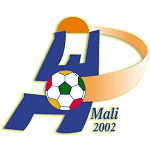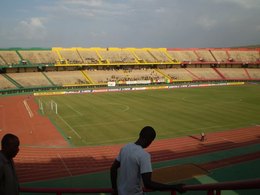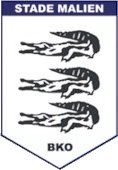
The 2002 African Cup of Nations was the 23rd edition of the Africa Cup of Nations, the association football championship of Africa (CAF). It was hosted by Mali. Just like in 2000, the field of sixteen teams was split into four groups of four. Cameroon won its fourth championship, beating Senegal on penalty kicks 3–2 after a goalless draw.

Stade du 26 Mars is located in the southern neighborhoods of Bamako, Mali. It serves as a home ground for domestic football club Stade Malien and is the national stadium. It has a capacity of 50,000 as an all-seater stadium. Built in 2001, it is named for the date of Martyrs' Day (Mali), a national commemoration of 26 March 1991 Bamako uprising which overthrew the dictatorship of Moussa Traoré. The stadium, which is built by China Overseas Engineering Group, served as a venue for 2002 African Cup of Nations.
Djoliba Athletic Club is a Malian football club and one of the two biggest teams in Mali alongside the Stade Malien. The team is based in the capital city of Bamako. It has its headquarters and three training stadia at Complex Sportif Hérémakono, in the Heremakono Quartier. The President of Djoliba AC, re-elected in 2009 to a four-year term, is Karounga Keita a Vice President of the Malian Football Federation, former trainer at the club, who was a player at the founding of the club in 1960. Djoliba or Joliba is the name of the Niger River in the Bamana language. Not only a football club, Djoliba AC is an Omnisports club which fields teams in many sports, and is operated as a membership organisation with an elected board.
This page details the process of qualifying for the 2008 Africa Cup of Nations.

Stade Malien is a Malian professional football and sports club based in Bamako. One of the two dominant clubs of Malian football, their eastern Bamako training grounds host other sports as well, including a successful basketball club.
This page provides the summaries of the CAF third round matches for the 2010 FIFA World Cup qualification. The 20 qualifiers were split into five groups of four, in the draw held on 22 October 2008 in Zürich. Teams in each group will play a home-and-away round-robin in 2009, with the 5 groups winners advancing to the World Cup Finals in South Africa.
The 2006 FIFA World Cup qualification CAF Group 1 was a CAF qualifying group for the 2006 FIFA World Cup. The group comprised Congo, Liberia, Mali, Senegal, Togo and Zambia.
This page details the process of the 2012 Africa Cup of Nations qualification phase. Forty-six African nations, including hosts Gabon and Equatorial Guinea, entered the competition. Gabon and Equatorial Guinea automatically qualified as host countries. The other 44 nations were drawn into eleven groups, each containing 4 teams. Togo was later added to Group K after its reinstatement.
The CAF second round of 2006 FIFA World Cup qualification began on 5 June 2004 and finished on 8 October 2005.
The 2003 season of the African Cup Winners' Cup football club tournament was won by Étoile Sportive du Sahel in two-legged final victory against Julius Berger. Étoile Sportive du Sahel never had the opportunity to defend their title as the African Cup Winners' Cup was merged with CAF Cup the following season into CAF Confederation Cup.
This page details the process of qualifying for the 1970 African Cup of Nations.
Group B of the 2015 Africa Cup of Nations qualification tournament was one of the seven groups to decide the teams which qualified for the 2015 Africa Cup of Nations finals tournament. Group B consisted of four teams: Algeria, Mali, Malawi, and Ethiopia, who played against each other home-and-away in a round-robin format.
Group C of the 2017 Africa Cup of Nations qualification tournament was one of the thirteen groups to decide the teams which qualified for the 2017 Africa Cup of Nations finals tournament. The group consisted of four teams: Mali, Equatorial Guinea, Benin, and South Sudan.
The third round of CAF matches for 2018 FIFA World Cup qualification was played from 7 October 2016 to 14 November 2017.
Group C of the 2019 Africa Cup of Nations qualification tournament was one of the twelve groups to decide the teams which qualified for the 2019 Africa Cup of Nations finals tournament. The group consisted of four teams: Mali, Gabon, Burundi, and South Sudan.
1930s – 1940s – 1950s – 1960s – 1970s – 1980s – 1990s – 2000s – 2010s
The 2019 Africa U-23 Cup of Nations qualification was a men's under-23 football competition, which decided the participating teams of the 2019 Africa U-23 Cup of Nations.
Group A of the 2021 Africa Cup of Nations qualification tournament was one of the twelve groups that decided the teams which qualified for the 2021 Africa Cup of Nations finals tournament. The group consisted of four teams: Mali, Guinea, Namibia, and Chad.
The third round of CAF matches for 2022 FIFA World Cup qualification was played from 25 to 29 March 2022. The ten group winners from the second round were drawn into five home-and-away ties. The five overall winners of these fixtures qualified for the 2022 FIFA World Cup.
Group G of the 2023 Africa Cup of Nations qualification tournament was one of the twelve groups that decided the teams which qualified for the 2023 Africa Cup of Nations finals tournament. The group consisted of four teams: Mali, Congo, Gambia and South Sudan.



